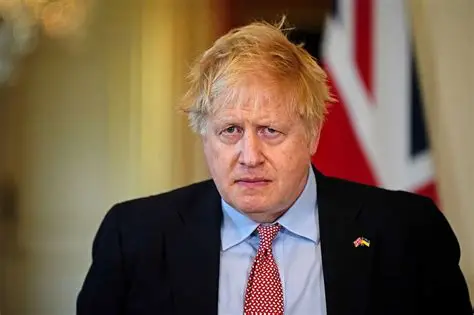It is not often that politics produces a story that feels like both a scandal and a stress test of democracy itself. The leak now known as the “Boris Files” has done exactly that. A trove of nearly 2,000 documents from Boris Johnson’s private office has exposed how a former prime minister may have blurred the lines between taxpayer support, personal enrichment, and influence-peddling on the world stage.
For a country already weary of political double standards, these revelations strike at something deeper than one man’s reputation. They cut to the heart of what public service is meant to stand for—and whether Britain still has the will to enforce that ideal.
What the “Boris Files” Contain
The leak is staggering in scope: internal emails, contracts, invoices, and notes that paint a picture of Johnson’s post-Downing Street life. At the center is his publicly subsidized office, funded by the Public Duty Costs Allowance, which is supposed to cover the modest expenses of carrying out residual public duties. Yet the files suggest that this taxpayer-funded apparatus also served as a launchpad for Johnson’s lucrative private ventures—helping to organize speaking gigs, pursue business investments, and cultivate wealthy patrons.
The claim alone would be explosive. But the files go further, suggesting that high-level contacts forged in government were later approached with proposals that blurred the boundary between diplomacy and deal-making.
The Core Allegations
Public money, private ventures
Johnson received more than £180,000 in public subsidies to cover staff and office support. The leak indicates that staff working under this allowance were not only handling public correspondence but also managing private business activity. To critics, this looks like public subsidy underwriting private gain. To Johnson’s defenders, it is administrative overlap, not corruption. Either way, the optics are damaging.
Access as currency
Perhaps more troubling are the instances where Johnson allegedly sought financial backing by leaning on relationships formed in office. From outreach to Gulf leaders in search of patronage for a business venture, to discreet conversations with billionaire Peter Thiel before Palantir won NHS contracts, the picture is of a former leader translating political capital into commercial opportunity.
The hedge fund payment
One of the most eye-catching threads concerns a £240,000 payment from a hedge fund following Johnson’s role in facilitating a meeting with Venezuela’s president. The sequence of events is murky, but the implication is stark: a bridge between high politics and private enrichment.
Party money under the microscope
The files also drag party finance back into the spotlight. Donations to the Conservative Party recorded under Rosemary Saïd’s name—amounting to £2.6 million over two decades—are now under scrutiny amid claims that her husband, who is not eligible to donate, may have been the real source. While the party insists everything was lawful, the episode underscores the vulnerability of Britain’s political finance system to loopholes and soft edges.
Why This Scandal Feels Different
Britain has weathered countless political scandals, from “cash for questions” to expense abuses. But the Boris Files land differently because they are not about a single lapse in judgment. They are about a system. The files portray a former prime minister methodically monetizing influence, institutional support, and global connections. Even if some of these actions skirt rather than break the rules, they reveal a playbook for how power can be converted into profit once the cameras have turned away.
This is not a morality play about one politician. It is a stress test of the standards Britain claims to hold. If this is permitted—if the rules prove too weak or too slow to act—then the message is clear: the revolving door is not a risk. It is the business model.
The Rules at Stake
Public Duty Costs Allowance
The PDCA was designed as a small safeguard, ensuring former prime ministers could maintain a minimal public role without being personally burdened. It was never intended as a back office for commercial enterprises. If PDCA-funded staff were indeed handling private deals, the system is either being bent beyond recognition or simply failing to prevent misuse.
ACOBA’s toothless oversight
The Advisory Committee on Business Appointments (ACOBA) exists to scrutinize the post-office activities of senior officials. In theory, former ministers should seek its approval before taking on work that might exploit insider knowledge or connections. In practice, ACOBA is slow, advisory rather than binding, and easily sidestepped. The Boris Files suggest that Johnson conducted outreach to foreign governments and investors in contexts that should have triggered ACOBA review, but didn’t.
Transparency gaps
Modern democratic accountability rests on transparency—yet many of the meetings, payments, and approaches flagged in the leak never appeared in official disclosures. Without timely reporting, the public is left guessing whether public office is being traded for private advantage.
Why It Matters Beyond Johnson
Trust in public life
Every scandal chips away at the presumption that politics is rooted in duty rather than deal-making. When the scandal involves a former prime minister, the damage is multiplied. Citizens can tolerate individual lapses. What they cannot stomach is the sense that the system itself has been normalized into a marketplace for influence.
Party finance
The Saïd donations illustrate how complex wealth structures and family arrangements can blur eligibility rules. Compliance teams struggle to untangle them, and loopholes allow questionable money to enter the system while still being technically lawful. Without stronger rules, party finance will remain a weak link in the chain of trust.
The international dimension
Perhaps the most alarming element is the global scope. In an era where foreign states and sovereign wealth funds are major players, the idea that former leaders might trade access to those relationships for private gain raises security as well as ethical concerns. What looks like business development may, in effect, be back-channel diplomacy conducted for profit.
What Reform Could Look Like
The scandal has sparked renewed calls for reform, and the blueprint is not complicated:
-
Tighten PDCA eligibility with mandatory audits and public reporting to prevent taxpayer funds from subsidizing private work.
-
Give ACOBA binding authority with real enforcement powers and penalties for violations.
-
Mandate real-time disclosure of paid engagements, beneficial interests, and foreign contacts within 30 days.
-
Strengthen donation verification to stop offshore or ineligible funds from flowing into politics under proxy names.
The Road Ahead
Supporters of Johnson dismiss the leak as politically motivated. Opponents argue that the problem lies not just with the man but with the weakness of the rules that allowed such behavior to flourish. The ethics investigation now underway will be a litmus test: either Britain proves it has the will to raise the bar on political standards, or it quietly signals that reputational storms can simply be ridden out until the headlines fade.
Bottom Line
The Boris Files offer something rare in political scandal: documentation rather than rumor, structure rather than accident. They reveal a pattern of blurred lines between public duty and private gain, and they force a stark question onto the national stage.
If Britain’s political system cannot respond to this moment with clarity, transparency, and enforcement, then the erosion of trust will not just continue. It will accelerate. And the next scandal will not shock, because it will already be assumed.

